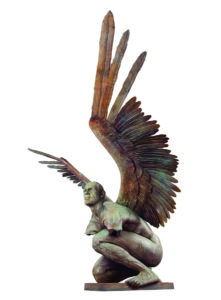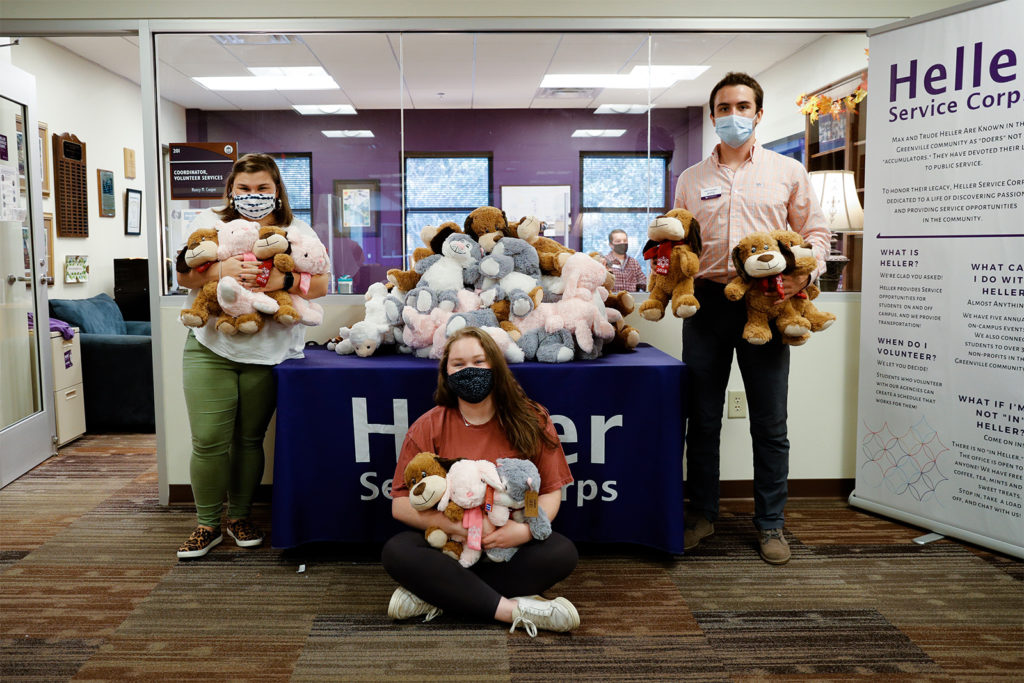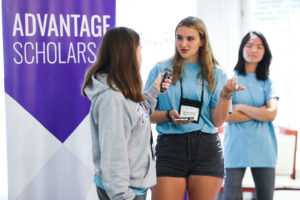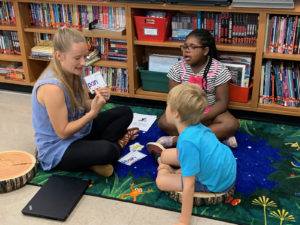PARTNERS IN PROGRESS
Harmonie Burney ’19, a graduate student in chemistry, conducts research
on mushrooms in August 2020 in Furman’s Townes Science Center.
When we combine social justice with environmental stewardship, we map a sustainable, inclusive future. And when our ideas are nourished, whether for new startup ventures or public policy studies, we grow closer to realizing our potential as a society with room and belonging for all.
For nearly 200 years, the Furman community has been enmeshed in the challenges, solutions and shared fortunes of South Carolina and beyond. It is a privilege that we honor. And it’s a trust that we earn anew with each community partnership – whether with Prisma Health, the Upcountry History Museum, the Greenville Drive or more than 70 nonprofits that serve South Carolina’s Upstate region.
Among the organizations and programs that make a measurable difference in the region and beyond are the Shucker Leadership Institute, the Furman Humanities Center, the Heller Service Corps and our four outward-facing institutes: The Hill Institute for Innovation and Entrepreneurship, The Institute for the Advancement of Community Health, The Riley Institute and The Shi Institute for Sustainable Communities. At Furman, our students can take on health disparities in our neighborhoods, apply design-thinking to nonprofit work, help create a city’s sustainability plan, or represent the United States at the Asia-Pacific Economic Cooperation. All of these experiences – and so many others – are possible because of these institutes and the interdisciplinary philosophy that animates them.
Together our institutes form a collective of expertise, extending a rich spectrum of immersive learning experiences and purpose-defining opportunities to students. The diversity of thought and specialization within this portfolio intersects with the liberal arts and sciences mission, allowing us to make progress on the world’s most stubborn challenges.

“El Tiempo,” sponsored by the Furman Humanities Center, is one of nine sculptures that make up the “Wings of the City” exhibit installed in downtown Greenville, South Carolina.
The Shi Institute is a regionally centered, community-focused hub that promotes sustainable human flourishing and recognizes the interdependence between social and equity challenges and environmental issues. Furman again ranked among the top 10 baccalaureate universities for sustainability, according to the Association for the Advancement of Sustainability in Higher Education.
Launched in 2020 after building on its national renown as the David E. Shi Center for Sustainability, The Shi Institute connects campus and community to the work of developing sustainable communities. The institute’s three centers focus on education, applied research and leadership through a variety of programs.
Student Fellows, in which students take a lead role in addressing campus or community sustainability issues, hosted its 350th fellow. The Community Conservation Corps weatherized its 160th home and was one of three U.S. institutions recognized in the International Green Gown Awards in the “Benefitting Society” category. The research team supported and informed critical community initiatives, including maps and analyses of local food insecurity, affordable housing, evictions, and access to health and social services. The institute launched a sustainability leadership program in partnership with Sustain SC and will help the city of Greenville facilitate and write its first sustainability plan.
Bridges to a Brighter Future, a college access and success program serving high school students through year-round programming, welcomes its 25th class this fall, supporting 25 high school graduates and more than 100 students in colleges across the country. The College Advising Corps’ eight college advisors assisted more than 1,100 South Carolina high school students this year.
The Riley Institute at Furman broadens student and community perspective about issues critical to South Carolina’s progress, builds and engages present and future leaders, and creates and shares data supported information about the state’s core challenges.
In September, just before the presidential election, The Riley Institute and Furman’s Osher Lifelong
Learning Institute co-presented the 10th annual StraightTalk series on voting rights. National experts, such as Robert Costa, moderator for PBS’s “Washington Week,” engaged in compelling discussions that drew hundreds of Furman students and viewers from across the state. After the U.S. Capitol insurrection in January, the institute hosted Derek Black, former white nationalist leader turned anti-racism advocate, to share his perspective on forces that motivated the mob.
In the fall of 2020, the choice to go virtual allowed the institute’s award-winning Diversity Leaders Initiative (DLI) to convene 46 participants in its first-ever statewide class, further growing the now 2,400-member cross-sector network of leaders equipped to leverage diversity to help drive solutions to long-term divisions and inequities that were exacerbated by the pandemic. The institute also launched a successful DLI graduate education program that helped 80 Riley Fellows navigate community and organizational expectations born from the current racial justice movement. Institute staff also began work on an oral history book project about the South Carolina Education Improvement Act of 1984, which passed under the leadership of former Gov. Dick Riley ’54; completed a five-year evaluation of OnTrack Greenville, a United Way of Greenville County initiative that helps students at high-poverty middle schools stay on track to graduate; and saw the White-Riley-Peterson Afterschool Policy Fellowship secure $310,000 through a continuation grant from the C.S. Mott Foundation.

Students volunteering with the Heller Service Corps gather stuffed bears to bring to pediatric hospital patients in October 2020.
pose in front of Furman’s Bell Tower
during Commencement 2021.
MEASURABLE
DIFFERENCE

Incoming first-year students who are recipients of select scholarships participate in the four-day Advantage Scholars Summer Program through The Riley Institute in June 2021.
The Hill Institute helps students launch social and entrepreneurial ventures. Now in its fourth year, the institute develops innovative and entrepreneurially minded leaders, grows an entrepreneurial community at Furman and contributes to the local and regional entrepreneurial environment.
Through pitch competitions, mentoring, internships, speakers, co-working spaces, boot camps and workshops, The Hill Institute – supported in part by its 45 Leadership Council members and 10 associate members – gives students from any discipline and major a platform to conceptualize, test and launch their social and entrepreneurial ventures. This mission’s key drivers include community partnerships with the S.C. Department of Commerce, the city of Greenville, Village Launch, NEXT and angel investor group VentureSouth. The institute’s third annual Summer Business and Innovation Boot Camp has now enrolled more than 83 students, including 25 in the past year, representing 13 universities.
Meanwhile, at the second annual Paladin Pitch Competition, more than 300 virtual attendees watched five competitors vie for more than $20,000 in grant awards. In October 2020, the Global Consortium of Entrepreneurship Centers recognized The Hill Institute as an Outstanding Emerging Entrepreneurship Center. Expanding Furman’s presence in the community, the institute located offices in downtown Greenville with NEXT, serving as the lead convener of entrepreneurship support organizations alongside the city. This year, the institute also launched a design-thinking partnership with Prisma Health, in which clinicians at Prisma Health, Furman students and Greenville County School District administrators used design-thinking methodology to address their organizations’ problems.
IACH facilitates high-impact student experiences and community engaged research, focusing on building partnerships in education and research, and championing key community programs with a commitment to health equity, justice and diversity.
The Institute for the Advancement of Community Health launched its inaugural leadership council in the Spring of 2021. The council champions, informs and advises the work of the institute, and serves as mentors to students and liaisons to the local, regional and national community health network.
In alignment with our commitment to health equity, justice and diversity, IACH hosted Finding Our Way Forward, a virtual session focused on identity-based inequities, their effects, and ways to combat oppression and injustice. The session was facilitated by President & CEO of CommonHealth ACTION Natalie Burke, and drew more than 150 community members and health care professionals, as well as Furman faculty, administration, staff and students. IACH expanded its partnership with the Magdalene Clinic to Oconee County, South Carolina, building on the initial success of the Greenville clinic. To date, the Greenville clinic has provided care for more than 325 women and hopes to see 30 women a year in the Oconee clinic. IACH continues to provide coordination and evaluation for this project.
The Master of Science in Community Engaged Medicine program welcomed its fourth, and largest cohort, 22 students, in June 2021, after receiving the highest volume and most competitive round of applications to date.
This year, the Medical Legal Partnership received its 1,000th referral. Since its start in 2016, the Medical Legal Partnership has connected Furman University, Prisma Health and South Carolina Legal Services in work to improve the health of people throughout the Upstate, especially those living in poverty.
Prepared to compete
The Malone Center for Career Engagement conducted 19 virtual career panels during the 2020-21 academic year, engaging 369 students with 62 alumni. The center also hosted its first-ever virtual career fair, Furman Career Connections, in February. The event provided more than 100 Furman students with the opportunity to connect with 40 top employers, including BMW, the U.S. State Department, Mather Economics, Nike, Hachette Book Group and ESRI.

Sarah Bradley, a Furman graduate student in education, teaches elementary school students in July during the university’s Summer Learning Place program, part of a graduate-level internship course leading to certification in special education.
The Malone Center also launched a senior outreach campaign in the Fall 2020. All seniors were paired with a dedicated career advisor to support them with their post-graduation plans throughout the year. Career advisors made 538 phone calls to seniors to offer support with their post-graduation plans and conducted 476 career advising appointments with seniors during the 2020-21 academic year.
Graduate studies at Furman
Furman’s four master’s programs offer students challenging coursework, field experiences and internships, to build the skills, creativity and knowledge to advance their careers.
MASTER OF SCIENCE IN CHEMISTRY
• The Master of Science curriculum is part of a five-year program in which students typically earn their Bachelor of Science after four years.
MASTER OF SCIENCE IN COMMUNITY ENGAGED MEDICINE
• This one-year master’s program provides an advanced understanding of science and population health related to the disparities between a population’s medical needs and resources.
GRADUATE PROGRAMS IN EDUCATION
• Master of Arts degrees are offered in teaching and in education, while the Education Specialist degree is a postmaster’s degree for experienced scholars and leaders in education.
MASTER OF STRATEGIC DESIGN
• The Master of Arts in Strategic Design provides an advanced understanding of art and communication theory through a portfolio school model.
after Commencement.
OF THE CLASS OF 2020
AMERICAN INSTITUTES FOR RESEARCH AMERICORPS
BLUE CROSS BLUE SHIELD
CAPGEMINI
DELOITTE
EPIC
ERNST & YOUNG
FEDERAL RESERVE BANK
GENERAL MOTORS
GREENVILLE COUNTY SCHOOLS INSIGHT GLOBAL
LIMA ONE CAPITAL
MATHER ECONOMICS
MERCER
MICHELIN
MILLIKEN & COMPANY NORTHWESTERN MUTUAL PRICEWATERHOUSECOOPERS
PRISMA HEALTH
SALESFORCE
SCANSOURCE
STRYKER CORPORATION
UNITED MINISTRIES
U.S. DEPARTMENT OF STATE
U.S. HOUSE OF REPRESENTATIVES
U.S. SENATE
GRADUATE SCHOOLS
BOSTON UNIVERSITY
CLEMSON UNIVERSITY
COLUMBIA UNIVERSITY
CORNELL UNIVERSITY
DUKE UNIVERSITY
FURMAN UNIVERSITY
THE GEORGE WASHINGTON UNIVERSITY GEORGETOWN UNIVERSITY
LONDON SCHOOL OF ECONOMICS MEDICAL UNIVERSITY OF SOUTH CAROLINA NEW YORK UNIVERSITY
NORTH CAROLINA STATE UNIVERSITY PRINCETON UNIVERSITY
UNIVERSITY OF COLORADO
UNIVERSITY OF FLORIDA
UNIVERSITY OF MICHIGAN
UNIVERSITY OF NORTH CAROLINA UNIVERSITY OF SOUTH CAROLINA UNIVERSITY OF TEXAS
UNIVERSITY OF VIRGINIA
VANDERBILT UNIVERSITY
WAKE FOREST UNIVERSITY
OF GRADUATES ARE EMPLOYED, ENROLLED IN GRADUATE SCHOOL OR PARTICIPATING IN SERVICE
CONTINUING EDUCATION 42%
CONTINUING EDUCATION AND EMPLOYED 3%
INTERNSHIP 3%
VOLUNTEER SERVICE/MILITARY 3%